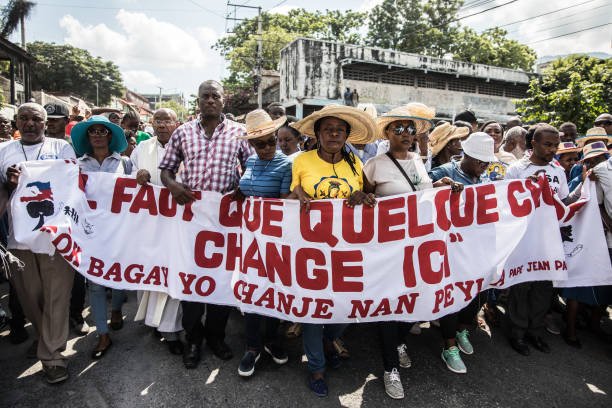Physical Address
304 North Cardinal St.
Dorchester Center, MA 02124
Physical Address
304 North Cardinal St.
Dorchester Center, MA 02124

Uncover the shocking truth behind Haiti's phantom officials and vanished funds in this exposé on The Corruption Nightmare.
Haiti, a country already grappling with numerous challenges, faces a severe crisis of corruption. At the heart of this issue are phantom officials and vanished funds, which have crippled the nation’s development.
The presence of phantom officials in Haiti’s government has enabled the misappropriation of funds, leaving critical infrastructure projects underfunded or abandoned. This corruption has far-reaching consequences, affecting not just the economy but the very fabric of Haitian society.
Understanding the depth of this problem is crucial. By examining the mechanisms behind vanished funds and the creation of phantom job positions, we can begin to unravel the Haitian corruption network.
Understanding Haiti’s corruption crisis requires a look into its past and present governance structures. The country’s history is marked by a complex interplay of political, economic, and social factors that have contributed to its current state.
Haiti’s corruption history dates back to its independence in 1804. Over the years, the country has experienced numerous political upheavals, coups, and dictatorships, creating an environment conducive to corrupt practices. Government corruption has been a persistent issue, with various regimes exploiting state resources for personal gain.
The current state of Haitian governance is characterized by weak institutions and a lack of transparency. Corruption scandals have eroded public trust in government, hindering efforts to implement meaningful reforms.
Several key institutions have been impacted by corruption, including:
| Institution | Impact of Corruption |
|---|---|
| Judiciary | Undermined independence, leading to biased judgments |
| Public Finance Management | Misappropriation of funds, leading to budget deficits |
| Public Works Department | Embezzlement in infrastructure projects, resulting in abandoned constructions |
The pervasive nature of corruption in Haiti underscores the need for comprehensive reforms to restore public trust and promote good governance.
Haiti’s government has been plagued by a unique form of corruption: ‘phantom officials’ or ghost employees who drain the national budget. This issue is complex and multifaceted, requiring a detailed examination to understand its full impact.
‘Phantom officials’ refer to individuals who are listed on the government payroll but do not actually work for the government. These ghost employees can include fictional persons or real individuals who are not actively employed but continue to receive salaries. The scope of this problem is vast, affecting various sectors of the Haitian government.
Ghost employees significantly drain Haiti’s national budget by siphoning off funds meant for public services and infrastructure. This misappropriation of funds results in reduced government revenue for essential services, exacerbating the country’s development challenges.
A notable example of this issue is the Ministry of Education scandal, where an investigation revealed a substantial number of ghost employees on the ministry’s payroll. This led to a significant loss of funds meant for educational infrastructure and services.
| Sector | Number of Ghost Employees | Estimated Annual Loss |
|---|---|---|
| Ministry of Education | 500 | $1 million |
| Ministry of Health | 300 | $600,000 |
| Public Works | 200 | $400,000 |
The presence of ‘phantom officials’ in Haiti’s government is a serious issue that requires immediate attention. By understanding the scope and impact of this problem, we can begin to formulate effective solutions to mitigate its effects on the national budget and public services.
Uncovering the truth behind Haiti’s vanished funds reveals a disturbing pattern of corruption that has plagued the nation for years. The mismanagement of public funds has not only drained the national budget but has also hindered development and exacerbated poverty.
Haiti has witnessed numerous financial scandals that have eroded public trust in government institutions. One notable example is the misappropriation of funds allocated for infrastructure projects, which were either left incomplete or never initiated.
| Year | Scandal | Amount Misallocated |
|---|---|---|
| 2010 | Post-earthquake reconstruction funds | $100 million |
| 2015 | PetroCaribe Fund misuse | $1.5 billion |
| 2018 | Senate embezzlement scandal | $20 million |
The PetroCaribe Fund was established to manage oil revenues and invest in development projects. However, it became a source of corruption, with billions of dollars misappropriated by government officials.
“The PetroCaribe Fund was a mechanism for corruption on a massive scale, undermining Haiti’s development and perpetuating poverty.” –
Tracking the misappropriated funds is a daunting task due to a lack of transparency and inadequate financial reporting. Investigators face significant challenges in tracing the flow of funds, often hindered by bureaucratic red tape and corruption.
The issue of vanished public funds in Haiti is a complex challenge that requires a multifaceted approach to resolve. It involves not only strengthening financial oversight but also promoting a culture of transparency and accountability within government institutions.
Haiti’s governance is plagued by corruption, including the presence of phantom officials and the misappropriation of public funds. This pervasive issue affects every level of government and public service, hindering the country’s development and exacerbating poverty.
Recent investigations have uncovered a significant number of ghost employees on the government payroll. These phantom officials drain millions of dollars from the national budget, diverting resources away from essential public services.
Some key findings from these investigations include:
Whistleblowers play a crucial role in exposing corruption in Haiti. Their stories reveal the depth of the corruption and the challenges faced in bringing perpetrators to justice.
One notable whistleblower reported a massive embezzlement scheme involving senior government officials. Despite facing significant personal risk, the whistleblower’s testimony led to several high-profile arrests.
Anti-corruption activists in Haiti face numerous risks, including:
Despite these risks, many activists continue to fight for transparency and accountability in Haiti’s government.
Their bravery is crucial in the fight against corruption. By shedding light on corrupt practices, they help to build a more transparent and just society.
Corruption has had a devastating impact on Haiti’s infrastructure and public services. The mismanagement of funds has led to a myriad of problems, affecting various sectors of the economy and society.
Many public projects in Haiti have been left unfinished or abandoned due to corruption. Funds allocated for these projects are often misappropriated, leaving infrastructure incomplete or non-existent.
The healthcare and education systems in Haiti are severely affected by corruption. Inadequate funding and mismanagement of resources have led to a decline in the quality of services provided.
A significant example of corruption’s impact is the misuse of post-earthquake reconstruction funds. Despite receiving substantial international aid, the reconstruction efforts were hampered by corruption, leading to minimal progress.
| Sector | Impact of Corruption | Consequences |
|---|---|---|
| Infrastructure | Abandoned construction projects | Inadequate public facilities |
| Healthcare | Misuse of funds | Poor healthcare services |
| Education | Lack of resources | Substandard education |
Corruption in Haiti has a devastating impact on its citizens, perpetuating a cycle of poverty and inequality. The human cost of this corruption is multifaceted, affecting various aspects of daily life.
The misappropriation of funds and resources due to corruption exacerbates poverty and inequality. Essential public services are either underfunded or nonexistent, leaving the most vulnerable populations without access to necessities like healthcare and education.
| Service | Impact of Corruption | Consequence |
|---|---|---|
| Healthcare | Underfunding due to misappropriation | Inadequate medical care |
| Education | Lack of resources and infrastructure | Poor educational outcomes |
As corruption becomes more entrenched, there’s a significant loss of trust in government institutions. Citizens begin to feel that their government does not serve their interests, leading to widespread disillusionment.
The dire situation pushes many Haitians to seek opportunities elsewhere, resulting in brain drain. The country’s most skilled and educated individuals leave, further weakening the nation’s capacity to develop and recover.

The cumulative effect of corruption is a Haiti where opportunities are scarce, and the future looks bleak for many. Addressing corruption is crucial to reversing these trends and ensuring a better life for all Haitians.
International aid plays a crucial role in Haiti’s development, yet it frequently finds itself entangled in the country’s corruption trap. The challenge lies in ensuring that foreign assistance reaches its intended recipients without being diverted by corrupt practices.
Foreign assistance can be diverted through various means, including misappropriation by government officials and ghost projects that exist only on paper. According to a report, a significant portion of Haiti’s international aid has been misused due to a lack of oversight and transparency.
“Corruption is a major obstacle to Haiti’s development, and it’s crucial that international aid is not used to line the pockets of corrupt officials.”
Donors have begun to take notice of the corruption concerns in Haiti, implementing various measures to ensure accountability. One such measure is the use of transparent funding mechanisms.
The United States Agency for International Development (USAID) has implemented several accountability measures, including regular audits and the requirement for implementing partners to report on their use of funds.
These efforts aim to ensure that aid is used effectively and reaches those in need. However, the challenge persists, and continued vigilance is necessary to prevent corruption from undermining Haiti’s development.
Understanding Haiti’s corruption requires examining the political power structures that facilitate it. The country’s political landscape is characterized by complex networks of influence that often prioritize personal gain over public interest.
Patronage networks play a significant role in Haiti’s political system, where leaders often reward their supporters with jobs, contracts, and other benefits. This clientelistic approach to governance creates an environment where corruption thrives, as officials are more accountable to their patrons than to the public.
High-level officials in Haiti often act with impunity, knowing that they are unlikely to face consequences for their actions. This lack of accountability is a significant factor in perpetuating corruption, as it allows officials to engage in corrupt practices without fear of reprisal.
The judicial system in Haiti is hampered by weaknesses that contribute to the culture of impunity. As Transparency International notes, “A weak judiciary unable to investigate and prosecute corruption cases effectively is a significant obstacle to combating corruption.”
| Factors Enabling Corruption | Description | Impact |
|---|---|---|
| Patronage Networks | Leaders reward supporters with jobs and contracts | Fosters corruption and undermines meritocracy |
| Impunity for Officials | Lack of accountability for high-level officials | Encourages corrupt practices |
| Judicial Weaknesses | Inability to effectively investigate and prosecute | Perpetuates a culture of impunity |
As
“Corruption is a major obstacle to Haiti’s development, and addressing it requires a multifaceted approach that includes reforming the political power structures that enable it.”
In the face of widespread corruption, Haitian civil society organizations are spearheading efforts to bring about transparency and accountability. These groups are crucial in exposing corrupt practices and advocating for reforms.
Civil society organizations in Haiti are actively working to combat corruption through various initiatives. They conduct investigations, provide legal assistance, and raise awareness about the impact of corruption on the country.
Haiti has legal frameworks in place aimed at combating corruption, including anti-corruption laws and institutions. However, the effectiveness of these frameworks is often hampered by inadequate enforcement and political interference.
Despite the challenges, there have been notable successes. For instance, some cases of corruption have been brought to light, leading to prosecutions. These victories, though small, demonstrate the potential for meaningful change.
| Initiative | Description | Impact |
|---|---|---|
| Civil Society Investigations | Exposing corrupt practices through thorough investigations | High-profile cases brought to justice |
| Legal Assistance | Providing legal aid to victims of corruption | Increased access to justice |
| Awareness Campaigns | Raising public awareness about corruption | Enhanced public engagement against corruption |

In response to the growing concern over corruption in Haiti, international actors have employed a range of strategies, from diplomatic pressure to targeted sanctions. These measures aim to curb the pervasive corruption that has hindered Haiti’s development.
The United States has been at the forefront of addressing Haitian corruption, implementing policies that include visa restrictions and financial sanctions on individuals involved in corrupt activities. As U.S. Secretary of State Antony Blinken once said, “The United States is committed to supporting the Haitian people in their efforts to build a more transparent and accountable government.”
Various global initiatives have been launched to combat corruption in Haiti. These include efforts by international organizations to enhance transparency and accountability in government dealings.
Targeted sanctions have been particularly effective in pressuring corrupt officials. By freezing assets and restricting travel, these sanctions limit the ability of corrupt individuals to operate internationally. According to a report, “Targeted sanctions have proven to be a crucial tool in the fight against corruption, as they directly impact those involved in illicit activities.”
Addressing Haiti’s corruption crisis requires a multifaceted approach that includes both institutional reforms and technological innovations. To effectively combat corruption, it’s crucial to strengthen the foundation of Haiti’s governance.
Institutional reforms are vital to creating a transparent and accountable government. This involves enhancing the capacity of government agencies through training and resource allocation, ensuring that officials have the tools and expertise needed to manage public funds effectively. Strengthening anti-corruption agencies and improving legal frameworks to prosecute corruption cases are also essential steps.
Leveraging technology can significantly enhance transparency and accountability in government operations. Two key initiatives include:
Implementing blockchain technology can provide a secure and transparent method for tracking financial transactions, reducing the risk of fund misappropriation.
Public disclosure systems require government officials to declare their assets and financial interests, promoting transparency and helping to prevent conflicts of interest.
By combining institutional reforms with technological innovations, Haiti can make significant strides in combating corruption and ensuring that public funds are used effectively for the benefit of its citizens.
Haiti’s corruption crisis is a complex issue that requires a multifaceted solution. As discussed, the presence of “phantom officials” and the misappropriation of public funds have severely hindered the country’s development.
To move Page 13, Haiti must address its corruption challenges head-on. This involves implementing institutional reforms, enhancing transparency, and ensuring accountability among government officials. The international community can play a crucial role in supporting these efforts through targeted aid and sanctions.
Haiti’s path forward is not without its obstacles, but with a concerted effort from both within and outside the country, there is hope for a more transparent and equitable future. By understanding the depth of the corruption challenges and working together, we can pave the way for sustainable development and improved living standards for the Haitian people.
Corruption is widespread in Haiti, affecting various levels of government and institutions, with issues like phantom officials and misappropriation of public funds, including the PetroCaribe Fund.
Phantom officials, or ghost employees, drain the national budget by siphoning off salaries and benefits meant for actual employees, thereby reducing the funds available for public services and infrastructure.
The PetroCaribe Fund was established to manage funds from Venezuela’s oil exports to Haiti. However, a significant portion of these funds was misappropriated, with money being diverted into private accounts and used for unapproved projects.
Tracking vanished public funds in Haiti is challenging due to a lack of transparency, inadequate financial reporting, and weak oversight mechanisms, making it difficult to identify and recover misappropriated funds.
Corruption hampers Haiti’s development by leading to failed public projects, abandoned construction, and crumbling healthcare and education systems, ultimately affecting the quality of life for Haitians.
The human cost of corruption in Haiti includes exacerbated poverty and inequality, loss of trust in government institutions, and increased migration pressures and brain drain, as people seek better opportunities elsewhere.
International aid can get diverted in Haiti through various means, including corruption within government agencies, lack of effective monitoring, and mismanagement by implementing partners, leading to aid not reaching its intended beneficiaries.
Anti-corruption efforts in Haiti include the work of civil society organizations, legal frameworks aimed at combating corruption, and initiatives to increase transparency and accountability, such as the use of technology for financial tracking.
Civil society organizations play a crucial role in fighting corruption in Haiti by advocating for transparency, monitoring government activities, and supporting whistleblowers, thereby helping to hold officials accountable.
Technology can help combat corruption in Haiti through initiatives like blockchain for financial tracking and public disclosure systems, enhancing transparency and making it harder for corrupt activities to go undetected.
Potential solutions to Haiti’s corruption issues include institutional reforms, capacity building, and the use of technology to enhance transparency and accountability, as well as global anti-corruption initiatives and targeted sanctions.